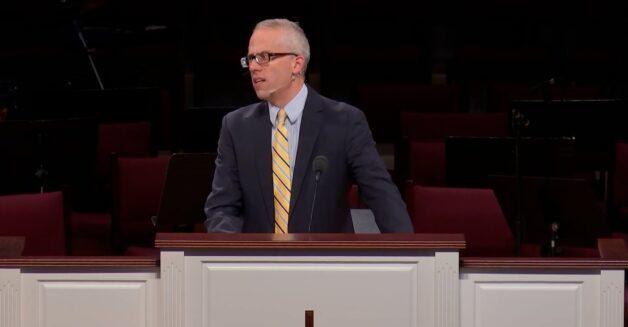Many Christians hold to the mistaken notion that every sin is the same in God’s eyes. Some Christians embrace this conviction by way of a misguided theological calculation—“If every sin deserves eternal judgment, then every sin must be equally heinous.” Others promote the idea for apologetic reasons—“Your sins are no worse than anyone else’s sins.” Still others believe in the equality of every sin out of a genuine sense of humility—“Who am I to think that my sins are less vile than anyone else’s sins?” While each of these reasons is understandable, and in some sense commendable, the witness of Scripture and the testimony of the church’s confessions tell a different story.
The assumptions embedded throughout redemptive history make clear that some sins are worse than others. Consider several examples.
- The Mosaic law prescribed different penalties for different infractions and required different sacrifices and payments to make restitution.
- The Mosaic law also distinguished between unintentional sins and high-handed sins (Num. 15:29-30).
- Sins of rank idolatry and willful rebellion were more serious indictments on the kings of Israel and Judah than was the sin of failing to remove the “high places” in the land.
- God’s anger was often specifically directed against the leaders of the people. That is, the sin of the king or the priests or the elders meant greater judgment than the sins of the laity.
- Jesus warned that cities in which he performed his miracles would be more severely judged than Sodom and Gomorrah (Matt. 10:15).
- Jesus considered Judas’s betrayal to be a sin worse than others (Matt. 26:24).
- God’s anger is especially roused when sins are against children, the weak, or the helpless (Jer. 32:35; Matt. 18:6; Luke 20:47).
- Excommunication seems to have been reserved for only the most flagrant sins (1 Cor. 5:1-13).
- Cornelius was considered a devout man who feared God (Acts 10:2). Though not saved by his good works, even among non-Christians there is a difference between being a decent person and being a dirty, rotten scoundrel.
- James teaches that there is a progression of sin: from tempting desires, to the internal nurture of those desires, to external action, to final death (James 1:14-15).
- According to John, there is a sin that leads to death, but not all sins are unto death (1 John 5:16).
The Bible simply doesn’t make sense—not the Mosaic law, not the exile, not church discipline, not the frequent warnings of judgment for certain transgressions—if all sins are equally vile in God’s eyes. In fact, life doesn’t make sense if every sin is the same. Parents do not discipline their children the same for every act of disobedience. Employers do not inflict the same punitive measures for every violation of company policy. Law enforcement officers do not treat every offense in the same way. Our judicial system does not hand down the same punishments for every infraction. We all know instinctively that some transgressions are worse than others.
As much as it shows admirable humility or apologetic concern, we must not act or teach as if every sin is the same in God’s eyes.
What we know to be true in ordinary life we must not forget in our spiritual lives. As much as it shows admirable humility or apologetic concern, we must not act or teach as if every sin is the same in God’s eyes.
A Little Help from the Larger Catechism
Here’s where the confessional documents of the church are so valuable. Take the Westminster Larger Catechism, for example, which makes clear that “All transgressions of the law of God are not equally heinous; but some sins in themselves, and by reason of several aggravations, are more heinous in the sight of God than others” (WLC 150). The Larger Catechism goes on to provide an extremely helpful analysis of what makes “some sins more heinous than others” (WLC 151). According to the Westminster Divines, sins receive their aggravations from four different categories. It’s worth looking at each one briefly.
- From the persons offending: if they be of riper age, greater experience or grace, eminent for profession, gifts, place, office, guides to others, and whose example is likely to be followed by others.
This means that sins are worse when they come from pastors or parents or public figures, when they come from those with a platform (to use our language), when they come from those who teach and write books, and when they come from Christians who should (and do) know better.
- From the parties offended: if immediately against God, his attributes, and worship; against Christ, and his grace; the Holy Spirit, his witness, and workings; against superiors, men of eminency, and such as we stand especially related and engaged unto; against any of the saints, particularly weak brethren, the souls of them, or any other, and the common good of all or many.
This means that sins are worse when they expressly blaspheme God or demean Christ and the gospel, when they reject the work of the Spirit in convicting of sin and revealing the truth, when they show disrespect to parents and persons in authority, when they ignore our weaker brothers and sisters, and when they lead many astray and have a poisonous effect in society at large.
- From the nature and quality of the offense: if it be against the express letter of the law, break many commandments, contain in it many sins: if not only conceived in the heart, but breaks forth in words and actions, scandalize others, and admit of no reparation: if against means, mercies, judgments, light of nature, conviction of conscience, public or private admonition, censures of the church, civil punishments; and our prayers, purposes, promises, vows, covenants, and engagements to God or men: if done deliberately, willfully, presumptuously, impudently, boastingly, maliciously, frequently, obstinately, with delight, continuance, or relapsing after repentance.
This means that sins are worse when they deal with matters that are black or white instead of gray, when they break forth externally not just internally, when they are frequent, when they are celebrated, when they cannot be undone, when they are against nature, against conscience, and against the warnings of others.
- From circumstances of time and place: if on the Lord’s Day, or other times of divine worship; or immediately before or after these, or other helps to prevent or remedy such miscarriages; if in public, or in the presence of others, who are thereby likely to be provoked or defiled.
This means that sins are worse when they take place in connection with the gathering of God’s people for worship, when they could have been avoided, and when they are committed in public so as to be well known to others.
Good for Us and for Others
If you’ve never studied WLC 151, the four categories above, not to mention the dozens of Scripture references I omitted, repay careful reading and meditation.
I can think of at least three benefits: public, pastoral, and personal.
When it comes to our public witness, we must have the courage to say that some sins are worse than others. Sins by pastors are worse than sins by parishioners. Sins by public figures with many followers are worse than sins by private individuals. And although all sexual sins are serious, we should not shrink back from teaching that sins against the light of nature—by which the Large Catechism means homosexuality (the sole reference is Romans 1:26-27)—are especially heinous, particularly when these sins are committed with delight and to the detriment of the common good.
Pastorally, distinguishing among various degrees of sin can help us apply the comfort and the warnings of Scripture more judiciously. Some of us are quick to pull the punch when the Bible would have us issue a stern warning, while others are ready to thunder judgment against our people for every offense. Likewise, when we learn to discern how “sins receive their aggravations,” we will have the proper categories to hold people responsible for the lesser sins even when others have sinned more grievously against them.
And finally, there are personal benefits to understanding the varieties of sins in the Bible. Too many Christians have flattened the moral contours of revelation such that we no longer distinguish between falling into sin and running headlong into sin. This means that some of us are too hard on ourselves (seeing no moral space between fallen temptations and flagrant disobedience), some of us are too easy on ourselves (believing our heinous sins to be little more than “struggles” or “mistakes”), and many of us give up striving after holiness because we will never completely leave sin behind in this life. The Bible points us in a different direction. Every sin deserves God’s wrath and curse (WLC 152), but not every sin is the same in God’s eyes.
Kevin DeYoung is the senior pastor at Christ Covenant Church (PCA) in Matthews, North Carolina and associate professor of systematic theology at Reformed Theological Seminary.





